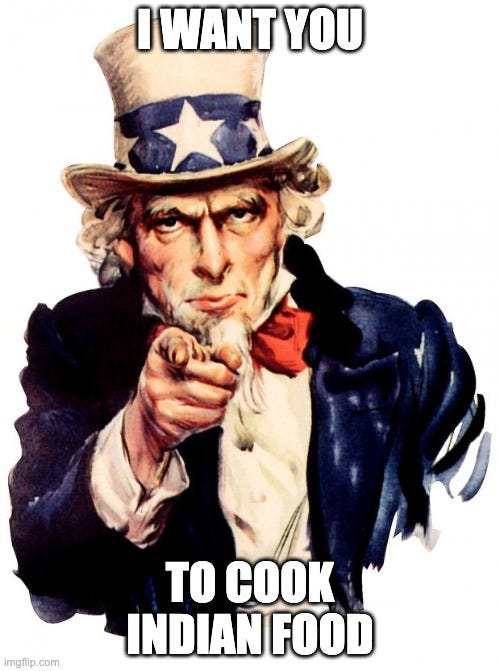what is the point of cooking, what is the point of improvisation, what is the point of indian
all the big questions answered. next up: what is the point of life
what is the point of this post
The point of this post is to convince you (yes YOU), New Subscriber, to become interested in cooking Indian food.

You’re here because you like my friend Nolen’s new project and you subscribed to his newsletter. You perhaps didn’t realize you were also subscribing to my weird project. Bad substack dark pattern, I know. I don’t make the rules, I’m just playing the game. You are of course welcome to leave. But before you do that, hear me out! Give me your precious attention, give me your eyes, because I have something very important for you. Something that could change your life. Or just, you know, be a fun new thing you didn’t expect.
blah blah all the usual reasons why people tell you to cook
I desperately want to not bore you and I respect your intelligence too much to belabor this: if you know what you’re doing then cooking can be cheaper and healthier than eating out.
“If you know what you’re doing” is doing a lot of work there. I promise you it’s possible to burn a lot of money and eat enormous quantities of junk food from the comfort of your own kitchen. It’s actually really fun to burn a lot of money and eat enormous quantities of junk food cooking for yourself! You should try it! I can show you how.
Of course everyone already knows that cooking is cheaper and healthier. Like exercise and flossing, you aren’t not cooking because you weren’t aware it’s cheaper and healthier. You’re not cooking because you think it’ll be work. That there’ll be a bunch of messy failure along the way. Because you’re not sure how it could fit into your lifestyle. There are fixes for each of those problems; that’s a big part of what this newsletter is about. But I want to talk about some more refreshing reasons to cook.
cooking is fun. cooking is play
You’re probably a grown-up so you have a lot of boring adult stuff you need to think about all the time. Maybe you’re reading this newsletter in your email, and right next to it is your ConEd bill. You go to work and do your email/meeting job and procrastinate by scrolling Twitter and come home and pull out your phone and order DoorDash and wait for your food by scrolling Instagram or whatever.
You could be cooking instead. You’d get to make a bunch of fun decisions like Oh I wonder if apple would taste good in this or What if I made this sauce creamier by adding some crème fraîche or Maybe I should pull out the chicken pieces and purée the sauce so it’s smooth.
You could be dealing with low-stakes fun little disasters. Oh no I oversalted the soup? Not a problem, add some water. If the water made it too thin then thicken it with a starch slurry. Now it’s not flavorful enough, so make a spiced garlic oil and stir it in. Or, instead of water, add some cream. Uh oh I smell waaay too much garlic? Smells like opportunity to me. Add a bulk ingredient that you cook separately so you dilute the garlickiness. Have the realization that oversalting is a lot like over-garlicking if you squint hard enough: the solutions are similar and involve similar trade-offs.
Or whatever, just eat it with waaay too much garlic. You don’t live in a museum, and you don’t cook in a restaurant. Having some happy little accidents necessarily involves being open to the possibility of a much larger number of, uhh, funny-tasting accidents.

cooking connects you to your evolutionary past
While food preparation is not unique to humans, we take it a lot further than other animals. Our digestive tracts have shortened, our jaws have become weaker and our teeth have become smaller in response to cooking. We’ve been doing it for at least half a million years. That’s cool: I don’t have very many skills that can be traced so far back.
I can unironically say that it’s part of my spiritual practice to cook. The last ice age was really, really hard! I’m descended from a long line of creatures, each of whom faced a tremendously difficult challenge. And for the last 16,000 generations or so, cooking has been a big part of how they made it. How they made me.
For the vast majority of the history of cooking, it was inherently improvisational, because it had to be. Writing was only invented recently, as were standardized measurements. My hunter-gatherer ancestors weren’t following written recipes and they had to make do with whatever was hunted and gathered that day. And they sure loved tasty food, because why else would they have such exquisitely good hardware for discerning that the food is tasty? Hardware that they’ve passed down to me. Thanks ancestors!
I doubt that this section will change anyone’s mind about whether to cook but I wanted to include the following image:
trouble using your words? use cooking to express love
Why go to therapy when you can read my newsletter and learn to cook instead? Then you can tell your friends you love them by spending hours sweating over stews, panicking when they show up before the food is ready, having stilted conversation because half your attention is on the three burners you still have on, and then hiding your intense anxiety as they taste what you made.
I have so many fond memories of cooking for the people I love. I made lobster rolls for an ex-partner’s birthday one year. I did a practice run a few days prior and we liked the results so much she invited a bunch more friends to the birthday. I sure cracked a lot of lobster claws that day!
Whenever she was sick she’d ask me to cook her chicken and dumplings. It reminded her of her mother who had died many years ago, before we ever dated. I never got to meet her mom but I felt connected to her because we cared for the same sick person in the same way.
Before I left home for college I made a fish curry for my parents. In my time away from home, that fish stew has become a household staple, and they named it after me. I no longer remember anything about what’s in it or how it’s made, and I think I prefer it that way. It’s funny and also sad: there are probably many foods that remind them of me, but that one has my name on it.
Soon after graduating, when I was still very new to cooking, I decided to make shrimp scampi for the girl I had a crush on. I bought shrimp from the supermarket and cooked it according to some recipe I found online. Little did I know that the shrimp I’d bought was pre-cooked! Cardboard scampi. Low-stakes fun little disasters. Evidently it wasn’t a deal-breaker: we dated for 5 years.
I’ve cooked for my little sister, her partner, my little brother, most of my friends, every romantic partner, my parents, my aunt, and my cousins. I haven’t cooked for any of my grandparents just yet. I should probably get on that, shouldn’t I? Life is so very short.
Perhaps most importantly, I cook for myself. It comes so easy to be hard on myself. While I can’t always find kind words for myself, I can always manage to make myself a treat ❤️.
indian cooking is magic technology
My aunt brought up two kids as a single mom with very little money, and she made Indian food every single day. When I first watched her cook I was shocked: she’d come home from work and make four healthy, delicious dishes from scratch in 30 minutes, while holding a conversation and sipping wine. That’s faster, cheaper and yummier than DoorDash.
In India, hundreds of millions of cash-poor, time-poor people use this technology to feed themselves every day. Many of them are vegetarians and they love their food. Indian cooking is a powerful technology, developed over centuries, for making delicious, healthy and cheap food. The tech is easily adapted to new ingredients: it assimilated tomatoes, potatoes and chili peppers, New World plants that arrived in India in the 16th century. More recently, cauliflower came to India in the 1820s. That’s right, both the starring ingredients in aloo gobhi are exotic foreign plants introduced to India by Europeans!
improvisation is fun, useful, and stimulating
Cooking without recipes gives you more slack: you are less constrained in what you can eat, because you can take whatever you have at home and make it into something good. You can go to the farmer’s market and buy whatever looks fresh or interesting, secure in your ability to make it yummy. You can buy whatever’s on sale at your grocery store instead of the specific ingredient a recipe calls for.
Cooking without recipes forces you to actually think about why you’re doing what you’re doing. That’s good because thinking is fun, thinking is innately human, and, I’d argue, thinking very hard is virtuous. That’s right, a moral imperative for subscribing to my newsletter.
Improvisation doesn’t have to mean cooking entirely without recipes. Sometimes you’re loosely following a recipe, changing things as you see fit, dealing with ingredients you don’t have, adding ingredients you need to use up. How are you going to know what to change? By learning the basic improvisational skills: a bunch of techniques, fixing various disasters, familiarity with ingredients and some food chemistry.
Improvisation is the first step to recipe development. Someone has to come up with all those recipes, right? How do they do that? By improvising a bunch and letting their palates guide them, then refining what they’ve discovered.
is this newsletter usually this fluffy and story-heavy?
No.














great post, loved this fluffy and story-heavy intermission 🥲